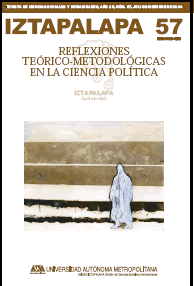Calidad y cantidad: estudios de caso, probabilidad condicional y contrafácticos
Palabras clave:
Inferencia estadística, métodos de Mill, probabilidad condicional, relaciones de tipo determinista, contrafácticosResumen
En contraste con los métodos estadísticos, existe un cierto número de métodos basados en estudios de caso –colectivamente conocidos como métodos de Mill, utilizados por generaciones de investigadores en ciencias sociales– que sólo toman en consideración relaciones de tipo determinista. Lo hacen en detrimento de sí mismos, pues si tomasen en cuenta las lecciones básicas de la inferencia estadística, podrían evitar serios errores inferenciales. Resulta de particular importancia utilizar probabilidades condicionales para poder comparar contrafácticos relevantes. Un ejemplo destacado que aplica los métodos de Mill es la obra States and Social Revolutions, de Theda Skocpol.Descargas
Citas
Barnard, John, Constantine E. Frangakis, Jennifer L. Hill y Donald B. Rubin 2003 “Principal stratification approach to broken randomized experiments: A case study of school choice vouchers in New York City”, en Journal of the American Statistical Association, vol. 98, núm. 462, pp. 299-323.
Bartels, Larry M. 1996 “Pooling disparate observations”, en American Journal of Political Science, vol. 40, núm. 3, pp. 905-942.
Bennett, Andrew 1999 “Causal inference in case studies: From Mill’s methods to causal mechanisms”, ponencia presentada en la reunión anual de la Asociación Norteamericana de Ciencia Política, Atlanta, 2-5 de septiembre.
Brady, Henry 2002 “Models of causal inference: Going beyond the Neyman-Rubin-Holland theory”, ponencia presentada en las decimonovenas Jornadas de Metodología Política de Verano, Seattle, 18-20 de julio.
Braumoeller, Bear F. y Gary Goertz 2000 “The methodology of necessary conditions”, en American Journal of Political Science, vol. 44, núm. 4, pp. 844-858.
Braumoeller, Bear F. y Gary Goertz 2002 “Watching your posterior: Comments on Seawright”, en Political Analysis, vol. 10, núm. 2, pp. 198-203.
Burawoy, Michael 1989 “Two methods in search of science: Skocpol versus Trotsky”, en Theory and Society, vol. 18, núm. 6, pp. 759-805.
Campbell, Donald T., y Julian C. Stanley 1966 Experimental and Quasi-Experimental Designs for Research, Houghton Mifflin, Boston.
Clarke, Kevin A. 2002 “The reverend and the ravens: Comment on Seawright”, en Political Analysis, vol. 10, núm. 2, pp. 194-197.
Cohen, Morris R. y Ernest Nagel 1934 An Introduction to Logic and Scientific Method, Harcourt, Brace, Nueva York.
Collier, David 1995 “Translating quantitative methods for qualitative researchers: The case of selection bias”, en American Political Science Review, vol. 89, núm. 2, pp. 461-466.
Collier, David y James Mahoney 1996 “Insights and pitfalls: Selection bias in qualitative research”, en World Politics, vol. 49, núm. 1, pp. 56-91.
Dawid, A. Philip 2000 “Causal inference without counterfactuals” (con debate), en Journal of the American Statistical Association, vol. 95, núm. 450, pp. 407- 448.
Dion, Douglas 1998 “Evidence and inference in the comparative case study”, en Comparative Politics, vol. 30, núm. 2, pp. 127-146.
Eckstein, Harry 1975 “Case study and theory in political science”, en Fred I. Greenstein y Nelson W. Polsby, comps., Handbook of Political Science, vol. 7 de Strategies of Inquiry, Addison-Wesley, Reading, pp. 79-137.
Geddes, Barbara 1990 “How the case you choose affect the answers you get: Selection bias in comparative politics”, en Political Analysis, núm. 2, pp. 131-150.
George, Alexander L. y Timothy J. McKeown 1985 “Case studies and theories of organizational decision-making”, en Robert F.
Coulam y Richard A. Smith, comps., Advances in Information Processing in Organizations, JAI Press, Greenwich, Conn., pp. 21-58.
Gerber, Alan S. y Donald P. Green 2000 “The effects of canvassing, telephone calls, and direct mail on voter turnout: A field experiment”, en American Political Science Review, vol. 94, núm. 3, pp. 653-663.
Goldstone, Jack A. 1991 Revolution and Rebellion in the Early Modern World, University of California Press, Berkeley.
Goldstone, Jack A. 1997 “Methodological issues in comparative macrosociology”, en Comparative Social Research, núm. 16, pp. 107-120.
Herron, Michael C., y Jasjeet S. Sekhon 2003 “Overvoting and representation: An examination of overvoted presidential ballots in Broward and Miami-Dade Counties”, en Electoral Studies, vol. 22, núm. 1, pp. 21-47.
en prensa “Black candidates and black voters: Assessing the impact of candidate race on uncounted vote rates”, en Journal of Politics.
Holland, Paul W. 1986 “Statistical and causal inference”, en Journal of the American Statistical Association, vol. 81, núm. 396, pp. 945-960.
Imai, Kosuke en prensa “Do get-out-the-vote calls reduce turnout? The importance of statistical methods for field experiments”, en American Political Science Review.
Lieberson, Stanley 1991 “Small N’s and big conclusions: An examination of the reasoning in comparative studies based on a small number of cases”, en Social Forces, vol. 70, núm. 2, pp. 307-320.
Lieberson, Stanley 1994 “More on the uneasy case for using Mill-type methods in small-N comparative studies”, en Social Forces, vol. 72, núm. 4, pp. 1225-1237.
Little, Daniel 1998 Microfoundations, Method, and Causation: On the Philosophy of the Social Sciences, Transaction Publishers, New Brunswick.
Mahoney, James 1999 “Nominal, ordinal, and narrative appraisal in macrocausal analysis”, en American Journal of Sociology, vol. 104, núm. 4, pp. 1154-1196.
McKeown, Timothy J. 1999 “Case studies and the statistical worldview: Review of King, Keohane, and Verba’s”, en Designing Social Inquiry: Scientific Inference in Qualitative Research. International Organization, vol. 51, núm. 1, pp. 161-190.
Mebane, Walter R., Jr., y Jasjeet S. Sekhon 2004 “Robust estimation and outlier detection for overdispersed multinomial models of count data”, en American Journal of Political Science, vol. 48, núm. 2, pp. 391-410.
Mill, John Stuart 1872 A System of Logic, Ratiocinative and Inductive: Being a Connected View of the Principles of Evidence, and the Methods of Scientific Investigation, Longmans, Green, Londres, 8a edición [1843].
Pledge, Humphrey Thomas 1939 Science since 1500: A Short History of Mathematics, Physics, Chemistry, [and] Biology, His Majesty’s Stationery Office, Londres.
Przeworski, Adam, y Henry Teune 1970 The Logic of Comparative Social Inquiry, Wiley-Interscience, Nueva York.
Ragin, Charles C. 2000 Fuzzy-Set Social Science, University of Chicago Press, Chicago.
Ragin, Charles C., Dirk Berg-Schlosser y Gisèle de Meur 1996 “Political methodology: Qualitative methods”, en Robert E. Goodin y HansDieter Klingemann, comps., A New Handbook of Political Science, Oxford University Press, Nueva York, pp. 749-768.
Robinson, W. S. 1951 “The logical structure of analytic induction”, en American Sociological Review, vol. 16, núm. 6, pp. 812-818.
Rubin, Donald B. 1974 “Estimating causal effects of treatments in randomized and nonrandomized studies”, en Journal of Educational Psychology, vol. 66, núm. 5, pp. 688-701.
Rubin, Donald B. 1978 “Bayesian inference for causal effects: The role of randomization”, en Annals of Statistics, vol. 6, núm. 1, pp. 34-58.
Rubin, Donald B. 1990 “Comment: Neyman (1923) and causal inference in experiments and observational studies”, en Statistical Science, vol. 5, núm. 4, pp. 472-480.
Salmon, Wesley C. 1989 Four Decades of Scientific Explanation, University of Minnesota Press, Minneapolis.
Seawright, Jason 2002a “Testing for necessary and/or sufficient causation: Which cases are relevant?”, en Political Analysis, vol. 10, núm. 2, pp. 178-193.
Seawright, Jason 2002b “What counts as evidence? Reply”, en Political Analysis, vol. 10, núm. 2, pp. 204-207.
Sekhon, Jasjeet S. 2003 “Making inferences from 2 x 2 tables: The inadequacy of the Fisher Exact Test and a reliable Bayesian alternative”, reporte de investigación disponible en jsekhon.fas.harvard.edu/papers/SekhonTables.pdf.
Sewell, William H. 1996 “Three temporalities: Toward an eventful sociology”, en Terrence J. McDonald, comp., The Historic Turn in the Human Sciences, University of Michigan Press, Ann Arbor, pp. 245-280.
Skocpol, Theda 1979 States and Social Revolutions: A Comparative Analysis of France, Russia, and China, Cambridge University Press, Cambridge.
Skocpol, Theda 1984 “Emerging agendas and recurrent strategies in historical sociology”, en Theda Skocpol, comp., Vision and Method in Historical Sociology, Cambridge University Press, Nueva York, pp. 356-391.
Splawa-Neyman, Jerzy 1990 “On the application of probability theory to agricultural experiments. Essay on principles”, sección 9, trd. D. M. Dabrowska y T. P. Speed, en Statistical Science, vol. 5, núm. 4, pp. 465-472 [1923].
Stigler, Stephen M. 1986 The History of Statistics: The Measurement of Uncertainty Before 1900, Harvard University Press, Cambridge.
Vandenbroucke, Jan P. 2001 “In defense of case reports and case series”, en Annals of Internal Medicine, vol. 134, núm. 4, pp. 330-334.
Waldner, David 2002 “Anti anti-determinism: Or what happens when Schodinger’s cat and Lorenz’s butterfly meet Laplace’s demon in the study of political and economic development”, ponencia presentada en la reunión anual de la Asociación Norteamericana de Ciencia Política, Boston, 29 de agosto a 1o de septiembre.




.jpg)

.png)
.jpg)




.png)
.png)
1.png)
